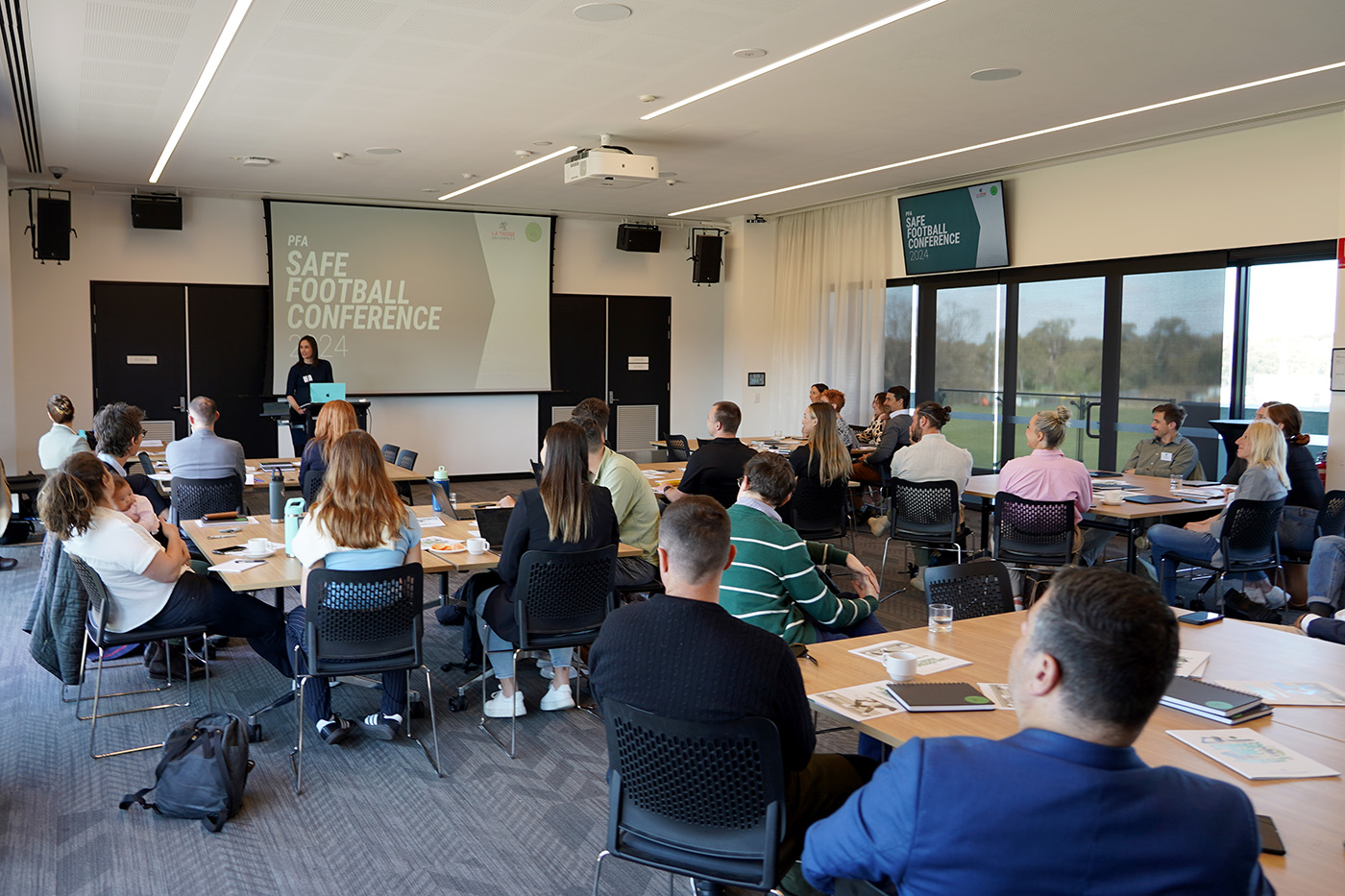Players call for a stronger industry commitment to establishing football as Australia’s safest sporting workplace as the PFA builds consensus through the inaugural Safe Football Conference

- by Admin
- October 30, 2024

Professional Footballers Australia (PFA) held the first Safe Football Conference yesterday at La Trobe University.
The conference sought to elevate the industry’s ability to address risks to the health and safety of players in a proactive and comprehensive manner by bringing together global experts across fields such as athlete abuse, concussion, disordered eating and addiction.
Attended by a range of stakeholders from across Australian football, speakers included:
- Kat Craig, an award-winning human rights lawyer with over 15 years of experience advocating for individuals and communities.
- Darren Burgess, High-Performance Manager at Adelaide Football Club and Chair of the FIFPRO High Performance Advisory Network, whose experience spans some of the world’s biggest clubs.
- Dr. Andrea Mosler, a Specialist Sports and Exercise Physiotherapist and Senior Research Fellow (Athlete Health) at La Trobe Sport and Exercise Medicine Research Centre.
- Dr Julien Periard, Research Professor and Deputy Director of the University of Canberra Research Institute for Sport and Exercise.
- Dr. Alex Culvin, a former professional footballer and now FIFPRO’s Director of Policy and Strategic Relations for Women’s Football.
- Chris Mordue, a counsellor and psychotherapist specialising in addiction and mood disorders, with vast experience supporting athletes.
- Alicia Edge, Co-Founder & Co-CEO of CompEat Performance and the Performance Nutrition Lead for Football Australia.
- Hayley Conway, CEO of Pride Cup, who has worked tirelessly for LGBTQI+ equality for over 15 years.
Several clear themes emerged across the topics presented, including:
- Data and evidence show professional sport is a high risk environment;
- Systems and culture must adapt to preserve the game;
- There are significant gaps in current practices, whilst these are not insurmountable the industry requires buy-in from football leadership to tackle them; and
- Strong recognition of the critical role of players voice must play in reshaping a safe industry.
Click here to read the Report.
Kat Craig commented on the conference:
“The PFA’s Safe Sport Conference delivered a ground-breaking approach to player safety.
“It was fascinating to hear from leading experts across a range of topics and learn about evidence-driven solutions to some of the game’s biggest challenges. Most importantly, it was refreshing to see consensus about how progress can only be made if we include the perspective of players. They are, after all, the beating heart of the sporting ecosystem without whom the game cannot flourish.
“While football has some way to go in changing cultures and improving systems if the game is to be safe and inclusive of everyone, the problem is by no means insurmountable.
“The PFA has demonstrated that it is playing its part in this process – now the ball is in the court of clubs, leagues and the FA to demonstrate it will match that commitment.”
PFA Co-Chief Executive Beau Busch commented on the conference:
“On behalf of our members we would like to express our gratitude to the speakers and those across Australian football who attended.
“The safety of our members is our number one priority.
“These challenges can be complex, however addressing them requires leadership and a commitment to respecting the voices of athletes.
“What it is clear is that the sport needs to move from a reactive to a proactive approach to ensure the safety of players.
“To honour the courage of Australian footballers, such as Lisa De Vanna and Warren Spink, who bravely shared their stories over recent years, the players are committed to making progress on these matters with Football Australia, the Australian Professional Leagues and the clubs.
“The next step will be to establish an independently operated ‘landing space’ where players can share concerns anonymously, managed by trusted peers and representatives dedicated to player protection and transparent monitoring of our members workplace experiences.”
The Latest News
-
November 23, 2024Perth onslaught exposes glaring Aussie absence; legend’s warning for ‘deflated’ Lyon — Talking Pts
-
November 23, 2024Tammy Hembrow marries reality TV star in stunning ceremony
-
November 23, 2024South African prodigy a PGA threat
-
November 23, 2024Round three tee-times – PGA Championship of Australia
-
November 23, 2024Australian PGA 2024: Cam Smith, Elvis Smylie and Marc Leishman book spots in dream final group – Australian Golf Digest


